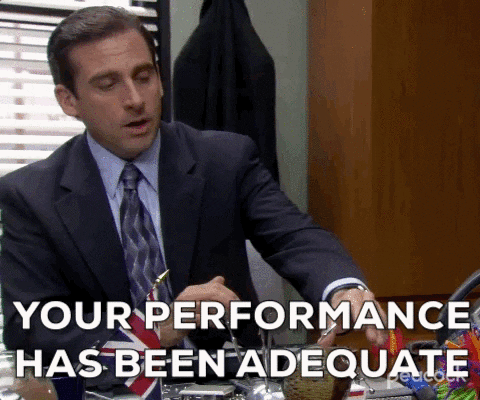The words “performance review” may sound a little frightening, with the sound effect “dun dun dun” following the infamous phrase. However, you may get more out of it than you expected, including a chance to improve yourself and your work performance. An evaluation of you and your work may seem scary, but let the following advice ease the process and provide a great experience with helpful feedback.
Read on to learn everything you need to know about performance reviews.
What is a Performance Review?

A performance review, also known as a performance appraisal or performance evaluation, is, well just that. A performance review is a method of evaluating and documenting an employee’s performance, usually conducted by a manager. Depending on the workplace, performance reviews can be conducted annually, semiannually, or quarterly. The purpose of this somewhat dreadful experience, as some would describe it, is to improve an organization’s effectiveness through evaluating each individual’s performance.
“Performance reviews can be efficient if the reviewer is trained on how to be objective, but this is very difficult as we are all different and have varied preferences. Oftentimes, performance reviews are more subjective and based on judgement. If there is a way to create checks and balances within the review process rather than having one person be the judge and jury, then I would say performance reviews could continue. Unfortunately, this is often not the case. Performance reviews should be based on skill and efficiency rather than if a person likes someone else or if that person does things ‘their way,’” NYC DOE educator Dena Campbell said.
Are They Effective?

In the past five years, performance reviews appear as a waste of time and an ineffective way on evaluating employees’ work ethic. It’s difficult to properly encapsulate the work ethic of a person through documenting attendance and objective. With the supervisors being the sole judge of employees’ work performance, it’s possible that the review can come out as biased or simply unfair due to one person wielding the power over the whole process.
“I have had many performance reviews both as an academic and a journalist. The academic reviews were informative in that they guided subsequent adjustments to my delivery of information, control of class discussions and pace of teaching. I embrace that information and incorporate it into my teaching paradigm. Some reviews experienced in the world of journalism had different, sometimes devious purposes. For example, a standard review would rate your productivity, team attitude, professional interaction and absences. In times of financial crisis, corporate takeover or change in management, the reviews were sometimes skewed to reflect preconceived outcomes, sometimes resulting in changes in worker function (bending union rules) or even a total change of staff,” St. John’s University Professor William Castello said.
A performance review should be constructive. It should point out problems in the working routine, offer correction and/or additional tasks that are intended to improve and not accuse or intimidate.
How Do You Prepare for a Performance Review?

If your first performance review is in the near future, you’re probably concerned about terms or of the process itself. That’s totally normal! Always ask questions. Don’t feel embarrassed if you don’t understand something. There’s a chance that the answer to your question is crucial to better your job performance.
The best way to prepare for a performance review? Keep your work consistent, sufficient and productive.
“You never know what someone will say when they are evaluating you. Every company, business or institution has their own standards through which they evaluate employees. Your work ethic is important and that needs to be consistent and evident in your performance at all times. Obviously, some people will have bad days or moments, but generally speaking you know when someone is a high performer and a quality employee,” said St. John’s University Assistant Director of Multicultural Affairs Mona El-Shahat.
To help you even further, document your job performance as a source of proof, a reminder to remain consistent, and to protect yourself as an employee.
Use Feedback to Your Advantage!

One thing to remember? Use the feedback you get to your advantage. Depending on your employer, the criticism won’t always come in the gentlest form, but keep in mind the main goal here aims to help you. If your boss is anything like Miranda Priestly from The Devil Wears Prada, you may hear some extra critique relating to your appearance and why your shoes don’t match your shirt, in which case the best advice I can give you is to smile and nod.
However, in receiving beneficial constructive criticism, your response either could show a lack of taking responsibility or show initiative to do better, and hopefully you’ll aim for the latter. One could do this by owning up to the mistakes they’ve made and prepare to offer solutions to the issues.
“Performance reviews are definitely important because you want to make sure you are learning in that environment while also being able to meet expectations and assist customers as well as you possibly can. I work at CVS Pharmacy and in my last performance review, I definitely learned ways I’d be able to assist customers better and in more efficient ways. For example, we should be filling a certain amount of scripts daily to hit budget, and one way I can help with that is make sure I’m offering to refill each script for each customer, so that our script count is higher,” CVS Pharmacy intern Enaam Zahriyeh said.
Performance reviews also help to see how well one adheres to a specific environment.
What Skills Can You Learn?

Other than the obvious positive aspect of enhancing one’s work ethics, performance reviews also help employees learn new skills and discover attributes they didn’t realize they had. Certain strengths and weaknesses will also determine where an employee should focus more time on; things learned in a performance review are not limited to the workplace of that person. For example, one might realize they tend to stray from being a team player. Try working on this attribute outside of the workplace as well.
“My last performance review helped me identify my development goals in my current role. For a performance review to be valuable to me, it shows me that my senior has an understanding of my skillset and how my strengths fit together with the strengths of the rest of my team to further my development. This personalized feedback is more effective as opposed to a generic performance review,” Delloitte Audit assistant Amneek Nagra said.
The objective is to look forward towards any improvement you can achieve. It’s important to set goals for yourself based on the critiques you received, but don’t forget to acknowledge your accomplishments— you deserve a pat on the back!
Speak Up!

Don’t look at your performance review as an obligation, look at it as an opportunity to embrace change and growth. Yes, you’re listening to your superior’s evaluations and concerns, but you also get the chance to use your voice as well. Voice your own concerns and issues if you have any, whether its issues among coworkers or work itself.
It’s also a good time to suggest a pay increase (if you have the evidence to show you’re worthy of it). Now, that doesn’t mean you need to emit Dwight Schrute, with a chart of your perfect attendance and state undying solidarity to the company. Simply support your claim with confidence.
You may dread your next performance review, but remember to look on the bright side. Make use of the time with your boss and take the opportunity to prove yourself as a hard worker. In the end, you may gain important feedback and advice that will help you be 10 times more efficient!



















